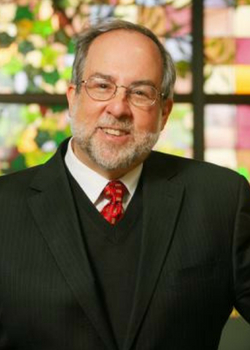Among those who left Egypt, there were two of my ancestors - call them Berel and Shmerel. As slaves, these two had grown so accustomed to looking down at the ground they could no longer lift their eyes. And so when Moses brought Israel across the Red Sea, Berel asked Shmerel, "What do you see?" "I see mud," he responded. "I see mud too. What's all this about freedom? We had mud in Egypt, we have mud here!"
When Israel stood at Mt Sinai, Shmerel asked Berel, "What do you hear?" "I hear someone shouting commands," he answered. "I hear commands too. What's all this about Torah? They shouted commands in Egypt, they shout commands here!" Finally after forty years, when Israel arrived at the Promised land, Berel asked Shmerel, "How do you feel?" "My feet hurt," he replied. "My feet hurt too. What's all this about a Promised Land? My feet hurt in Egypt, my feet hurt here!"
So what did they do? They turned around and walked back to Egypt. Some say, they are wandering the wilderness to this day.
Removing the external chains of slavery doesn't make a person free. The body is unfettered but the mind remains in bondage. "One of the great liabilities of life," declared Martin Luther King in one of his last sermons, "is that all too many people find themselves living amid a great period of social change, and yet they fail to develop the new attitudes, the new mental responses, that the new situation demands. They end up sleeping through a revolution."
Freedom, in the Torah, comes in two parts: The exodus from Egyptian slavery and the revelation of law on Mt Sinai.
Why law? Law seems an odd place to find spirituality. Law is technical and dry. Law is about conflict and confrontation. Law is a restraint on the lowest parts of ourselves. In Western culture, law is an instrument for achieving social order -- a way to keep us from killing one another.
Now consider a law from Maimonides' Mishna Torah, Code of Jewish Law: You must give charity to the poor. You must give at least one tenth of your income, but may not give more than one fifth. When you give charity to the poor, the dignity of the poor must be respected. You may not humiliate the recipient of charity. Anonymous giving, where neither donor nor recipient are aware of one another's identity, is best. Even better is to provide employment or business opportunity thus alleviating the need for further assistance.
Notice how this is phrased. It doesn't say the poor have a right to receive charity. This isn't an entitlement. It says you have an obligation. It is a mitzvah, a commandment. This is the core concept of Jewish law: You are obligated because you are covenanted.
This law speaks, not to the lowest in us, but to the highest. "You shall be holy, for I the Lord Your God am Holy." The purpose of law in the Torah is to cultivate the holy, the compassionate, the just, the sensitive within us -- to cultivate the divine within us. Law is educative. In Breshit Rabbah, the sage Rav taught: “ Does God really care how people slaughter animals for food? Does God care which animals a person eats and which he doesn't eat? Mitzvot were given us only to purify us.” The mitzvah has a purpose. We must measure ourselves not solely on the care we take in fulfilling the mitzvah, but on the quality of change the mitzvah affects within us. The authority of mitzvah rests not only in its source in heaven, but in its effect on the human soul.
Law is a nexus between what is and what ought to be. Law rests upon a paradox: Because we're human, we need law. Because we have drives, because we often forget who we are, because we have the ability to rationalize any behavior or attitude...in other words, because we're human, we need law. But we can live up to the law only because we have the divine with us. Every "ought" implies a "can." The commandment to be holy -- to live a life of justice and compassion -- is the strongest possible confirmation that we have the capacity to be holy. It is testimony that we have Godliness in us.
"The great danger facing all of us," wrote the preacher Phillips Brooks, "is not that we shall make an absolute failure of our life. Nor that we shall fall into outright viciousness. Nor that we shall be terribly unhappy. Nor that we shall feel that life has no meaning. The danger is that we shall fail to perceive life's greatest meaning, fall short of its highest good, miss its deepest and most abiding happiness, be unable to tender the most needed service, be unconscious of life ablaze with the light of the Presence of God, and be content to have it so.
The danger is that we will wake up to find we've missed life itself. Satisfied too soon with too little -- with a life that falls short of the best.
Shabbat Shalom!

